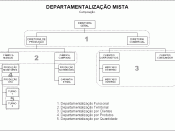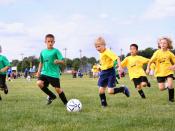One indicators of an effective team is highly competent individual job performance.
The manager should try to inculcate a healthy working environment and create a foundation for establishing core values. The journey to success has always been a planned one, where the means are as important as the goals.
An organization manned by highly-competent workers performed well. Organizational objectives cannot be achieved unless every member in the team works in harmony. They should render selfless-services to carry out the mission and reach the goals as well.
Competition on the other hand drives companies to continuously adopt endless innovations to stay on the top in the world market. It must be a teamwork guided with ethical conduct to maintain harmonious relationship among peers in the team.
An effective manager determines in advance what he hopes to achieve for the organization and follow through its conclusion. Constant dialogue, honesty, transparency, and open-mindedness are just few factors to be considered in an effective teamwork.
Organizational goals should be achieved not only with respect for laws, but in achieving individual and teams desires. We cannot deny the fact that all organizations need to create revenue and control cost in order to survive. The resources in the organization we serve must be utilized with concern. These resources will sustain team to function effectively. Effective team must determine in advance what he hopes to achieve for the organization. Manager should encourage his team to excel in their respective role. Individual efforts also must be recognized to motivate team members to work harder.
Effective Teams 3From the foregoing readings, many companies introduced teams into their production processes. As evidenced, teams strives to fulfill their responsibility but moves at a measured pace Management has found teams as flexible and responsive to changing events than are traditional departments.
From the simulation, I've decided to consider the following individuals to compose my team: Collins - Grass - Diodorus - Tang - ChoudhuryAs I can see in their respective background and personal interest, these five individuals will make up a good team. Before joining Luxurion Auto, these five individuals already possesses high technical experience complemented with their personal interest towards the community. Their skills redound to the common good only if it is used with responsibility.
It is important to consider that the organization is a system of individuals. Thus individuals should work not only to maintain their human dignity but also to strengthen the organizational stability.
When people work together toward a common objective, trust and commitment will follow. No great human achievement has ever been accomplished without trust. Nor has a man been able to achieve greatness without trust.
This sense of mutual accountability also produces the rich rewards of mutual achievement in which all members share.
The five individuals possessed high-technical skills with vast work experiences that makes up their individual personality strong enough for an effective team. It's not what the team has, but what it can do with what it has that matters in attaining its organizationalEffective Teams 4goals. It can turn failure and mistakes unto success by turning on new innovative ideas.. Obviously, teams cannot get started without some minimum complement of skills especially technical and functional ones. It is equally common to overemphasize skills in team selection. Undoubtedly, skill is the most sought after qualifications of a team member.
Collectively, a manager must consider the following factors to raise an effective team:Adequate resources - teams can do variety of things. They make products, provide services, negotiate deals, coordinate projects, offer advice, and make decisions. These require mobility from one place to another, thus budget is always available to sustain their functionality.
Climate of Trust -. They are more likely to take risks and expose vulnerabilities when they believe they can trust others on their team. It is the foundation of leadership. It allows the team to be willing to accept and commit to their leaders' goals and decisions.
Interpersonal skills - every member of the team does equivalent amount of real-works, including the leader for the good of the organization. Strong interpersonal skills leads to camaraderie among team members, creating workplace harmony. This includes recognizing the interests and achievements of others.
Trainings - it develops teamwork skills. It will teach team members the value of teamwork and give the practical skills for working in teams. It carves out time and space in which work teams can experiment and learn. It will sharpen individual's skills. Highly trained individual builds confidence towards work performance.
Individual Performance vs. Team PerformanceEffective Teams 5One substantial barrier to using work teams is individual resistance. It is the role of the manager to tame this resistance and turn it into a meaningful participation in attaining the goals of the team. Manager should provide trainings, workshops to help employees improve their problem-solving, communication, negotiation, conflict-management, and coaching skills. They're reminded of the importance of patience. The manager should also give rewards like: promotion, pay raises, and other forms of recognition to acknowledge individual effectiveness as a collaborative team member.
Teams work best in compelling context. The manager will choose people both for their existing skills and their potential to improve it and learn new ones. Pay particular attention to first meetings and actions. First impression always mean a great deal. They pay particular attention to those in authority. And, as always, what such leaders do is more important than what they say. Set some clear rules of behavior to help achieve their purpose and performance goals. Set and seize upon a few immediate performance-oriented tasks and goals---the sooner such results occur, the sooner the team congeals. Challenge the team regularly with fresh facts and information. New information causes the team to redefine and enrich its understanding of the performance challenge, thereby helping the team shape a common purpose, set clearer goals, and improve its common approach. A manager should allow team to spend lots of time together to enhance creative insights as well as personal bonding to share knowledge and learn working as a team. Exploit the power of positive feedback, recognition, and reward. Giving out award helps to shape newbehavior critical to team performance.
Effective Teams 6Dealing with Conflicts and Improve Team EfficacyConflicts often cropped up when there is interpersonal incompatibilities, tension, animosity toward others which we called it relationship conflict. However, team disagreements over task contents also create conflicts, we called it task conflicts. Conflicts can actually improve team effectiveness as this will stimulate discussion, promote critical assessment of the problems and options that lead to better team discussions. As team increases the collective beliefs that future efforts will lead to success, teams develop confidence in themselves, which in turn motivates them to work harder. The manager must take into consideration member preferences, abilities, personalities, and skills. And, implement work-design that will motivate and increase member's sense of responsibility and make the work more interesting to perform. He will provide trainings to increase interpersonal relationship among members. Deploy teams strategically when they are the best tool to do the job and foster the basic discipline of teams that will make them effective.
Observing overall guidelines and effectively implement the suggested measures to have an effective team, surely I, as a manager would successfully achieve the teams purpose and goals. Needless to say, applying the four contextual factors would build an effective team.
Finally, as a manager, I have chosen the following components of the four contextual factors of an effective team:â¢Climate of trust - it allows the team to be willing to accept and commit to their leader's and decisions.
â¢Abilities of members - it sets as parameters for what members can do and hoEffective Teams 7effectively they will perform on a team.
â¢Task Identity - the ability to complete a whole and unidentifiable task or product for the good of the team.
â¢Specific goals - although team has a common goals, it is important that each member should have in mind a set of individual goals that will motivate and energize them to work harder to attain team's common goals.
EFFECTIVE TEAMWORK RESULTS FROM IDENTIFYING ROLES AND RESPONSIBILITIES AND ASSIGNING THE MOST KNOWLEDGEABLE PERSON TO EACH ROLE. TEAMWORK PROVIDES INDIVIDUAL THE OPPORTUNITY TO BENEFIT FROM THE KNOWLEDGE ACCUMULATED BY OTHERS________________________________________________________________________REFERENCESKatzenbach, J.R. and Smith, D.K. (1993, March-April). The Discipline of Teams. Harvard Business Review. p. 91.
Robbins, S.P. (2005) Creating effective Teams: Organizational Behavior. Prentice-Hall.
p. 277Myers, J. (1999, September 02. What it takes to make a team: Career Development Cross-Functional Team Part-V. Purchasing Magazine. p. 91


